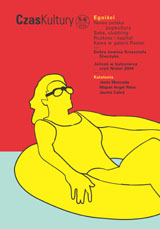Paryż, Londyn – z dachu. Nowa polska popkultura – sztuka miejska czy mieszczańska?
Paris, London and Nothing. Is the New Polish Pop-Culture City Art or Middleclass Art?
Author(s): Ewa MajewskaSubject(s): Fine Arts / Performing Arts
Published by: Stowarzyszenie Czasu Kultury
Summary/Abstract: A negative critique of women’s pop art and literature Social issues vs. literary and artistic ignorance “Baby pink” + swear words = meeting the readers’ and viewers’ needs Critical feminism vs. creative subjectivity What is the value of the works of young women writers and artists in Poland? Is it merely the “fulfilled dream of a satisfied consumer”? Ewa Majewska, in her analytic view of women’s pop culture gives the following verdict: there is no trace of depth or soul in the works of these young artists and writers. The argument for this negative critique is their lack of social involvement. What they represent is a narrow and subjective perspective full of mundane banality that is not worth the reader’s and viewer’s effort. This includes the literature of Agnieszka Drotkiewicz (with her novel Paris, London, Dachau) and Dorota Masłowska as well as the art of Agata Bogacka and Endo, which reveal a “materialistic nonchalance” that in the light of the present high unemployment figures is awkwardly grotesque. Their works represent a typical trait of the middle classes, i.e. “distancing themselves from the lower classes as well as their unsophisticated needs and uncurbed desires”. Ewa Majewska speculates that this may also be caused by the authors’ and artists’ lack of knowledge of social issues and the skills to deal with them. Perhaps focusing on recording the trivial trinkets of life really means “capitulating in the face of the massive and incomprehensible world”. What is more, their readers and viewers seem to want both the “sweetness” provided by Bogacka’s paintings and Endo’s blog, as well as a dose of disgust and swearwords from Masłowska’s writing. And Drotkiewcz’s novel, Paris, London, Dachau, in which the main character “focuses on her own sock” and suddenly finds herself in hospital, satisfies both these needs. From Ewa Majewska’s feminist perspective the artistic and literary voice of these writers and artists is extremely impoverished. But is this spitefully-sounding voice of criticism constructive?
Journal: Czas Kultury
- Issue Year: 2004
- Issue No: 05-06
- Page Range: 51-59
- Page Count: 9
- Language: Polish
- Content File-PDF

